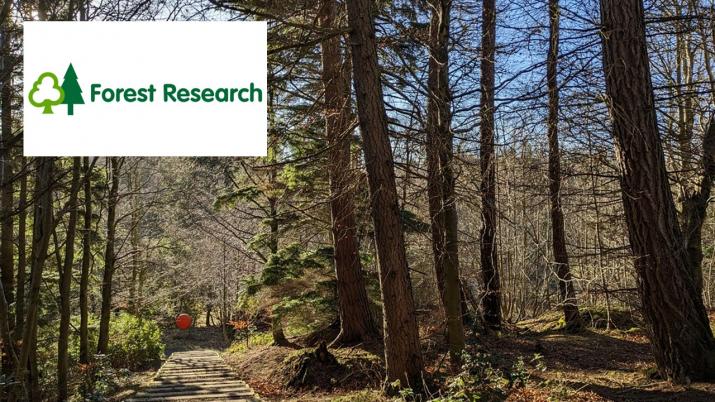
Title image credits: ialeUK/ Chloe Bellamy 2023
Petra Guy, Scientist – Forest Fungal Ecology, Forest Research
https://www.researchgate.net/profile/Petra-Guy
twitter: @FR_LUES
Tell us about a typical day in your work life
My days are very varied, which is something I love about this job. I might be reading articles for research, analysing data, looking after plants in the greenhouse, designing experiments or writing a paper. But my favourite days are out in the woods. Luckily for me, I spend a lot of time on field work.
How long have you been working in landscape ecology?
I recently finished a PhD in which I studied mycorrhizal fungi, their behaviour, and their role in ecosystem functions. I started at Forest Research after that, and I’ve been here for about ten months. I came to this field relatively late – having had a previous career in physics and then a break to raise a family. To be honest, I didn’t expect to have a second career, I thought that after being a stay-at-home mum, finding work would be difficult. I was wondering what to do and I started training in horticulture, planning to set myself up as a gardener, something I love doing. But somehow, through no clear planning on my part, just by following my heart, I got a place on a PhD at Reading studying mycorrhizal fungi.
What (or who) got you involved in landscape ecology?
Whilst I was at home being a mum, I watched a TED talk by Suzanne Simard in which she explained her research on mycorrhizal fungi. I remember it very clearly and I thought at the time how amazing it would be to work in the field. At that point in my life, I thought it was fantasy to imagine that I could restart a career after a long break, let alone in a completely different field. So, when I saw a PhD advertised at Reading University with Brian Pickles who has worked closely with Suzanne Simard, I knew I had to apply.
What is your favourite UK landscape?
I love any woodland, I feel a weight is lifted off my shoulders as soon as I’m under the trees, but I adore the forests on the west coast of Scotland, where you can’t hear the traffic and you can wander for hours without seeing a soul.
What are you working on at the moment, and where?
I am looking at the difference in mycorrhizal fungal communities between planted woodlands, existing woodlands and trees which naturally colonise abandoned agricultural land. We know that mycorrhizal fungi are essential for tree health, but some of these fungi may be lacking in ex-agricultural land, and this may have an impact on colonisation success for some tree species.
What do you most enjoy about you work, on a day-to-day basis?
I enjoy thinking about woodland ecology at landscape scales. There are so many factors which interact to influence woodland processes that I find that looking at trees ‘in the wild’ and trying to understand the connections and systems as a whole is extremely challenging – and rewarding.
Whose work inspires you?
Again, I have to say Suzanne Simard. The way she looked at the forest as an integrated system. It seems obvious now that it makes no sense to think of trees as isolated entities. I don’t know if she was the first person to try and show that - but she are part of that system. was the first person I had seen communicate that so clearly. Ecology is about understanding multiple interactions between organisms, and how they all work together to operate as a system. Sadly, I think that humans don’t fully appreciate that we
What do you regret?
Not being a woodland ecologist sooner! I knew from an early age that I was obsessed with forests. For some reason I studied maths and physics instead! I enjoyed that too, I do love maths, and now I get the opportunity to apply mathematical modelling to forests – perfect!
What would you not say as a landscape ecologist?
This is a difficult question, and it probably depends on what day of the week you ask. When you study ecology, you see what a precarious situation so many parts of our landscape are in. One thing that I see frequently is the amount of damage we humans are causing woodlands. I speak to many people and organisations who care about woodlands passionately; private landowners and charities who are trying to protect woods they manage, sometimes with little or no help or funds. Members of the public I meet during my work tell me how their lives are hugely enriched by access to woodlands, and they care deeply for them. But on the other hand, I worry that there can be a lack of respect for nature and a lack of understanding of the danger our woodlands are in. I’m not referring to working woodlands, managing woodlands as a resource is important, and the right sort of management tends to increase woodland diversity. I’m thinking about leisure activities, from foraging to mountain biking to dog walking - our landscapes are under huge pressure from us. It’s a difficult conversation, because we want people to get outside and connect with nature – how else will people learn to love and appreciate it? But might we need to be much more careful about what we do in woodlands? Instead of foraging, could we record mushrooms and plant species? Should we be stricter about sticking to walking and cycling paths - leaving more spaces undisturbed? I think better communication is required between the academic community and the public to explain the situation, because I have certainly spoken to many people who are unaware of how their activities might be damaging – and who would be happy to get stuck in and help look after the woods they love.
What advice would you give to anyone considering a career in landscape ecology?
Go for it!